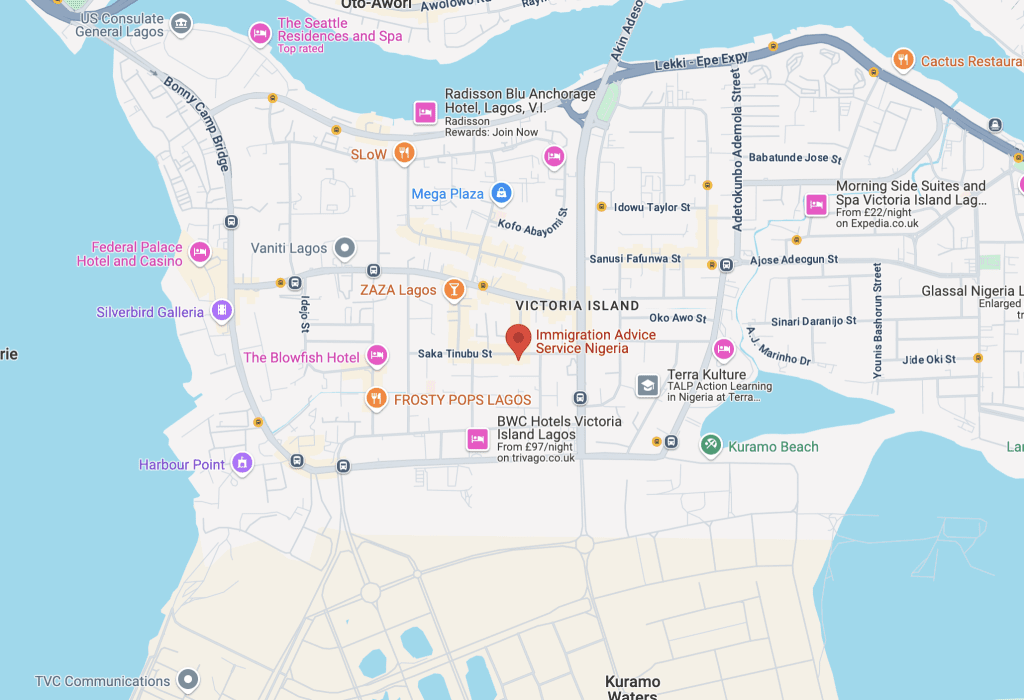R-1 Visa for Nigerians
If you are a Nigerian minister or a non-minister in a religious occupation, you may be eligible to apply for the R-1 non-immigrant visa.
For more information about how to apply for an R1 visa, do not hesitate to reach out to our Lagos office at +2342013438882, or at +44 (0) 3316300929 or contact us online. We are ready to offer visa application guidance and give you more details about the eligibility criteria and how to apply.
Read our 1001 reviews
Request a call back from our immigration experts
Immigration Advice Service Nigeria
Benefits of Choosing IAS‘ USA Immigration Lawyers
When it comes to obtaining a USA visa or permit, IAS USA immigration lawyers are well-equipped to help you.
With IAS’s track record of successfully helping clients visit or immigrate to the United States, we can help businesses and individuals achieve their goals.
Our dedicated immigration lawyers provide our services through a comprehensive and personalised approach. With IAS, you enjoy:



Compassionate support from an experienced immigration lawyer dedicated to your success



Support in gathering supporting documents and completing a high-quality application.



Confidence that your case is being handled by an experienced team.



In-house document checks done by lawyers who are well-versed in US immigration matters.
Services we Provide
Want to Work in the U.S. as a Minister?
We have a proven track record of assisting numerous Nigerians in obtaining their R-1 visas. If you’re considering working in the U.S. as a minister and require guidance on how to get started, feel free to contact us for expert assistance. Allow us to handle the details and provide you with comprehensive support.
Nigerian Emigration
For Nigerian emigration matters, please call +2342013438882 or +44 (0) 3316300929
Other Immigration and Emigration Matters
For immigration/emigration to/from other countries, please call:
US – +1 844 290 6312
Ireland – (+353) 061 518 025
UK – (+44) 333 4149244
Overview of the R1 Visa
The R1 visa is one of the U.S. non-immigrant visas, allowing Nigerians to live in the U.S. temporarily while working as ministers in an approved religious institution.
The religious institution must have ties to a religious denomination in the U.S., has a joint-tax exemption, or is registered as a non-profit vocational organisation in the United States.
Religious workers who want to apply for this visa must meet the eligibility requirements to apply. Priests, missionaries, translators and catechists are some of the religious workers eligible to apply.
Other religious workers like administrators, clerical staff, janitors and fundraisers are not eligible to apply.
The R-1 non-immigrant visa will allow you to stay in the U.S. for an initial 30 months. After that, you can extend it for another 30 months, making it a total of 5 years.
Note that there is no limit to the number of R-1 non-immigrant visas that can be approved.
What Are the Eligibility Criteria for Nigerian Religious Workers?
You must meet some eligibility requirements as a Nigerian religious worker to be eligible for an R-1 visa. Firstly, you must be considered a minister of religion. This means you have been permitted and authorised to carry out religious duties by your denomination.
Proof of this authorisation must be presented when applying for the R1 visa. Additionally, you must:
- be a member of an approved and recognised religious organisation that has a branch in the United States for at least 2 years
- possess an employment offer to work in the U.S. for at least 20 hours every week in an affiliate of the religious organisation you belong to
- be a member of the clergy or work in a liturgical setting
- be coming to do a specific religious duty in the U.S.
What Are the Eligibility Criteria for the Religious Organisation?
The religious organisation you are coming to work for as a Nigerian minister must also meet the eligibility criteria set by the USCIS.
USCIS must recognise them as a religious denomination with well-established doctrine, mode of worship, rituals and festivities. They must also have a well-structured hierarchy and a recognised system of belief.
Additionally, the organisation you want to work for must be:
- A non-profit vocational organisation in the U.S. that has ties to your denomination in Nigeria
- A non-profit religious organisation in the US
- A non-profit religious organisation in the U.S. that holds a group tax exemption certificate.
What Are the Required Documents?
Overview
You and the religious organisation you are applying to work for in the U.S. must show certain documents during your R-1 visa application process.
Required Documents from the Religious Organisation
- Form 1-129, Petition for a Nonimmigrant Worker
- Current and valid determination letter from Internal Revenue Service showing that the religious organisation does not pay tax
- Salary payment schedule for the incoming religious worker
- Signed Religious Denomination Certification from the authorised heads of the religious denomination if the non-profit organisation is affiliated with a religious denomination.
If the religious organisation determines that any of the eligibility requirements is against their faith or infringes on their right to exercise religion, they can apply for an exemption.
The exemption is granted under the Religious Freedom Restoration Act (RFRA). Such an organisation must send a written request for exemption.
The request must effectively demonstrate how the eligibility requirement:
- Mandates them to participate in an activity that is against their religious belief;
or
- Prevents them from participating in an activity that aligns with their religious belief.
Required Documents from the Religious Worker
- ECOWAS passport that is valid for at least 6 months after your visa expires
- Confirmation page of Form DS-160
- Visa fee receipt
- Approved Form I-797
- Certificate signed by the authorised head of your religious organisation
- Employment offer from the U.S. based religious or vocational organisation
- Evidence of belonging to your religious denomination
- Educational and religious qualifications
- Proof of funds or payment schedule from the U.S. employer
- Visa appointment letter.


How to Apply for the R-1 Non-immigrant Visa from Nigeria
Overview
The application for the R-1 visa is divided into three parts. First, your U.S. employer must file a petition on your behalf. Your employer must get approval on the petition before you apply for the visa. After that, you can now apply for an interview with the U.S Embassy or Consulate in Abuja or Lagos.


File Form I-129, Petition for Nonimmigrant Worker
This is the first step in the R-1 visa application process, and it is initiated by the religious organisation in the U.S. In this process, the religious organisation is referred to as the petitioner, while the religious worker is referred to as the beneficiary.
The petitioner has to log on to the official website of United States Citizenship and Immigration Services. Form I-129 can be downloaded from there. Petitioners must download and fill out the form with the most current date.
After completing the form, the petitioner must file Form I-129 at any of the following service centres:
- The Texas Service Centre
- The Nebraska Service Centre
Or
- The California Service Centre
Where the petitioner should send the form to depends on the location of the organisation’s headquarters. As a rule of thumb, you file forms at the service centre that covers the area where your headquarters is located. This stands even if the beneficiary will undergo training at different locations in the U.S.
Even though USCIS will direct forms files from the wrong location to the right one, it is necessary that the petitioner files them correctly to save time.
If your petitioner wants a faster service, they can file Form I-907 at the same time they file Form I-129. Before doing this, they have to check if the premium processing service is available. Do note that premium processing comes at a cost.
Note that all sections of the form must be completed and the form signed. If the form is unsigned, the application will be rejected.
After filing Form I-129, USCIS will issue the petitioner Form I-797, which will either confirm their approval or denial.
If Form I-129 is approved, the petitioner will send Form I-797, which you will include in your application.
Do note that the USCIS conducts onsite inspections of the religious organisation and the place where the beneficiary will work. This can sometimes be before or after a decision is made on the application.
They do this to verify the information supplied by the religious organisation. Hence any address provided should be correct, or else risk a denial.
Religious Worker Online Application
The second step of the application process is the online application by the Nigerian religious worker.
First, you must visit the U.S. embassy’s website and file Form DS-160, Online Nonimmigrant Visa Application. This form is completed and filed online. The USCIS will collect your personal information and reason for visiting the U.S.
It takes approximately 90 minutes to complete the form if all your documents are handy. However, you can save your application and return to it later.
Do note that you have 30 days to finish an application you started.
After you submit the form, you will be directed to a confirmation page where you will sign and also get a code. Print this page out and add it to your file. You will be required to present it at the visa interview.
Schedule an Interview
The last step in your R-1 visa application is scheduling a visa interview. You are generally exempt from a visa interview if you are younger than 14 or older than 79.
Interviews are scheduled at the U.S Embassy in Abuja, located at 1075 Diplomatic Drive, Central District Area, Abuja or the U.S Consulate in Lagos located at 2 Walter Carrington Crescent, Victoria Island, Lagos.
Appointment wait times vary, and it is advisable to schedule an interview early. When you get an appointment date, pay the visa application fee before your interview.
At the interview, the consulate officer will be the one to determine if you are eligible for a visa. Be ready also to give the officer more information as regards your background and purpose of going to the U.S.
When entering the United States, keep your documents handy as you will need to present them to the Border Protection and Control officer. They are the last to determine if you can enter the U.S.
Fees and Processing Times
Fees
The religious organisation will have to pay $460 to file Form I-129. This payment can be made with a cheque, credit card or money order and paid to the Department of Homeland Security. This fee is nonrefundable, no matter the decision on the application.
If the organisation applies for premium processing, they will have to pay an additional $1,225.
Filing Form DS-160 will cost you $190, and the visa application fee will cost you $205.
Note that all of these fees must be paid before the visa interview.
Processing Times
After filing Form I-129, it may take USCIS 180 days to make a decision on the application. With premium processing, the USCIS will send a response within 14 days.
Due to the appointment date wait time, it may take as long as 120 days to get a final decision on your visa application. The wait time varies from country to country.


R-1 Visa Validity
The R-1 non-immigrant visa can be valid for up to 30 months. After that, an extension is possible for another 30 months. At the end of the 60 months, which is 5 years, you are required to leave the United States and stay away for at least 1 year.
You can then reapply for an R-1 visa from outside the United States. The time counted for the R-1 visa is time spent physically in the United States.
R-1 Visa Dependants
You can bring your relatives to the U.S from Nigeria as your dependents. However, they can only be your spouse or unmarried children who are under 21 years of age.
They can apply to come to the U.S. with you at the same time you applied or apply later after getting your visa. You must be ready to prove your relationship with them by submitting a marriage or birth certificate.
Your dependents are granted R-2 visas, which do not permit them to work in the U.S. But they can study on a part or full-time basis.
How Can IAS Help With R-1 Visa Application?
Applying for an R-1 visa is a lengthy and complex process that requires detailed attention. The process is rigorous and involves collecting and filing forms. This can often be a tedious and overwhelming process. But IAS can help.
At IAS, we have the expertise and experience with non-immigrant applications. We have helped many Nigerians with their R-1 applications, immigration advice and appeals.
We can also help evaluate your eligibility and that of the religious organisation that will file a petition for you. We can as well take a look at your document and theirs and ensure they meet the standard required by the USCIS.
Our office in Lagos is full of qualified lawyers who can help you during the application process. For more information about our services and how we can help, you reach out to a member of our team online today. You can also call us at +2342013438882 or +44 (0) 3316300929.
Table of Contents
Table of Contents will appear here.Legal Disclaimer
The information provided is for general informational purposes only and does not constitute legal advice. While we make every effort to ensure accuracy, the law may change, and the information may not reflect the most current legal developments. No warranty is given regarding the accuracy or completeness of the information, and we do not accept liability in such cases. We recommend consulting with a qualified lawyer at Immigration Advice Service before making any decisions based on the content provided.
Frequently Asked Questions
You can travel freely with an R-1 visa in and out of the United States. And the time you spend outside the United States does not count as your visa time.
You can study while you are on the R-1 visa. You can choose to enrol in a part or full-time study, especially if it is instrumental in effectively discharging your duties.
You can get a green card with an R-1 visa after working with the visa for at least 2 years. Religious workers can use the EB-4, Special Immigrant Route: Religious Worker, to change status. The requirement for the adjustment of status is the same as the requirement for an R-1 visa.


What our clients are saying
How our UK Immigration Lawyers can help
At the Immigration Advice Service our lawyers specialise in a wide range of UK visas, nationality and asylum applications and have represented clients in various successful complex and high-profile cases.





















